新概念英语第二册 课件 Lesson14——Do you speak English(15张PPT)
文档属性
| 名称 | 新概念英语第二册 课件 Lesson14——Do you speak English(15张PPT) |
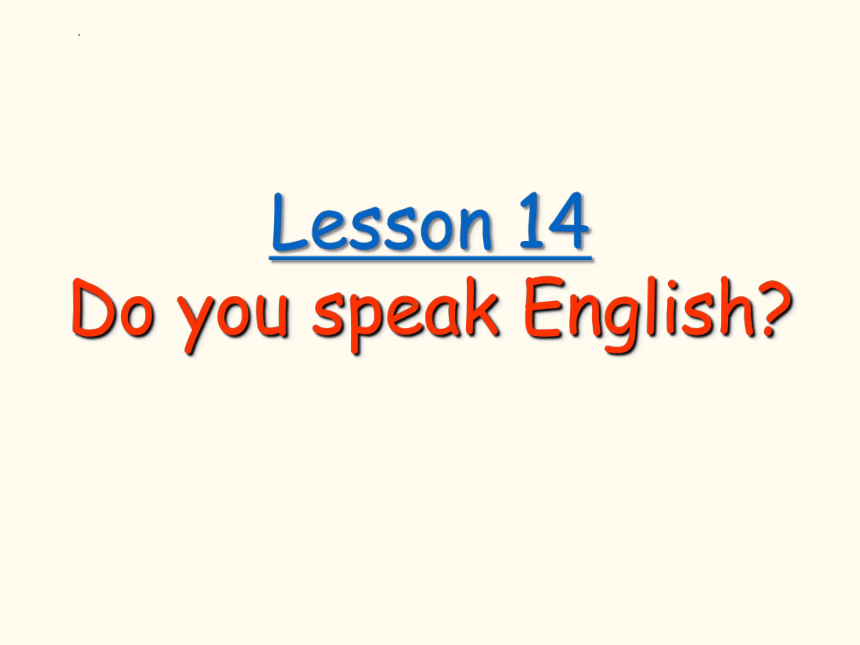
|
|
| 格式 | pptx | ||
| 文件大小 | 3.0MB | ||
| 资源类型 | 教案 | ||
| 版本资源 | 新概念英语 | ||
| 科目 | 英语 | ||
| 更新时间 | 2024-02-13 00:00:00 | ||
图片预览

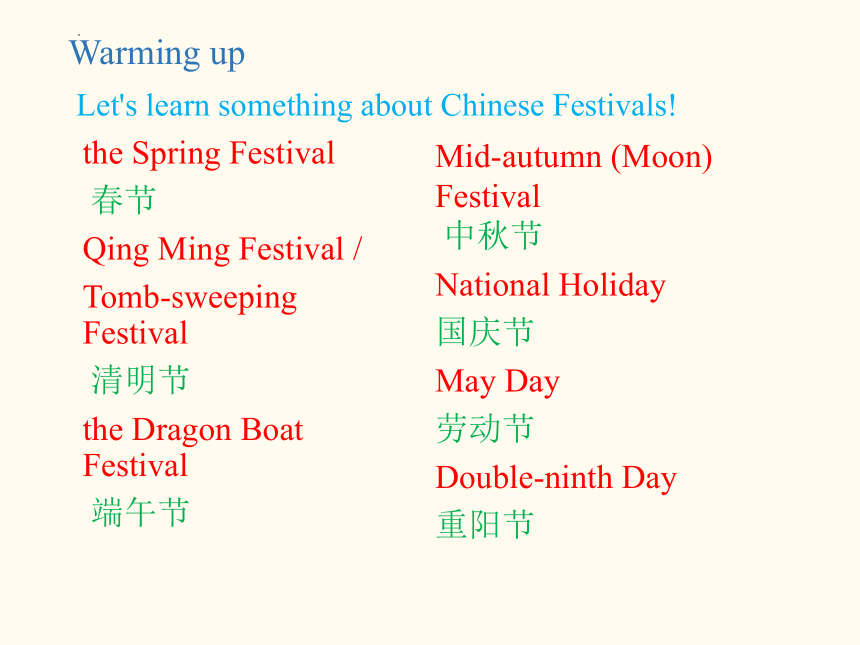
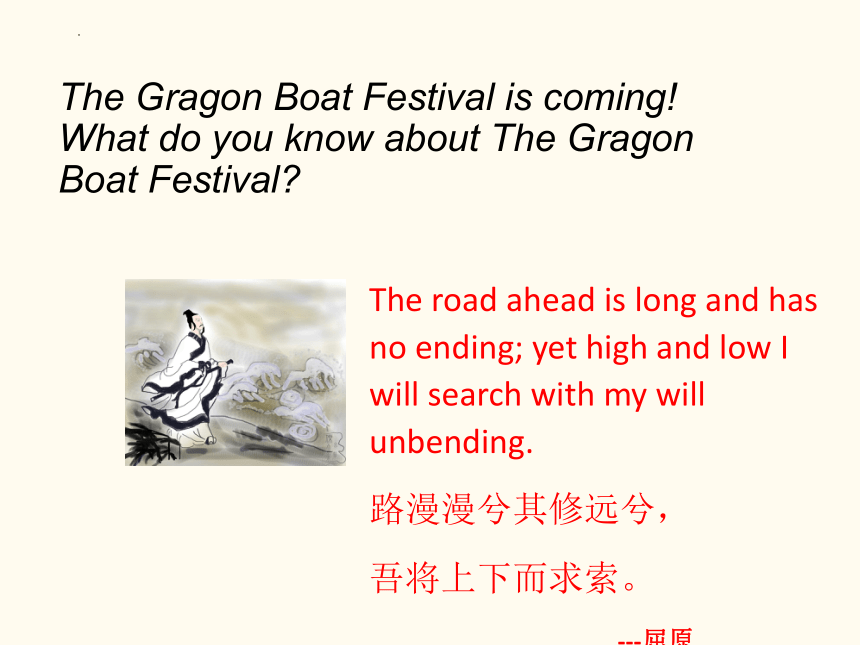
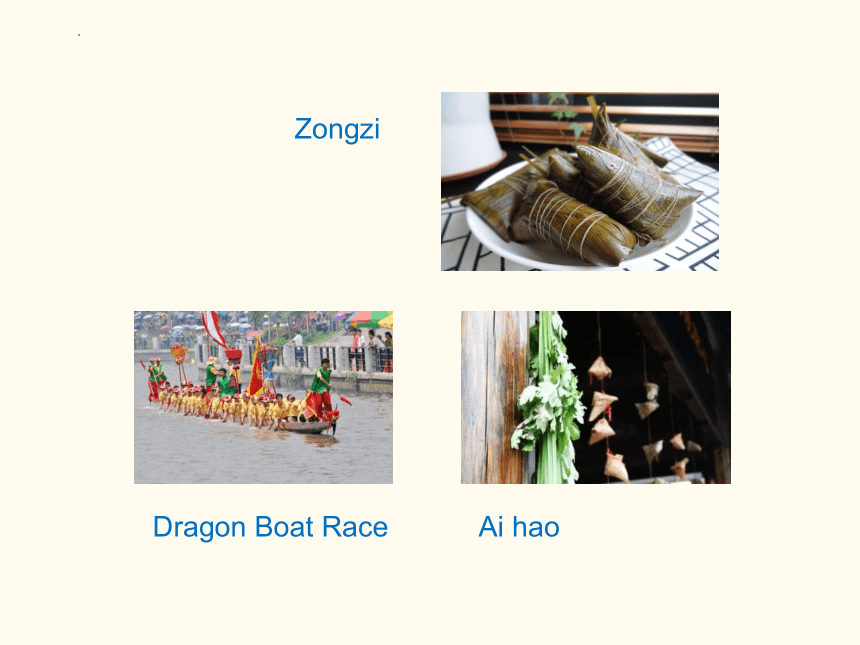
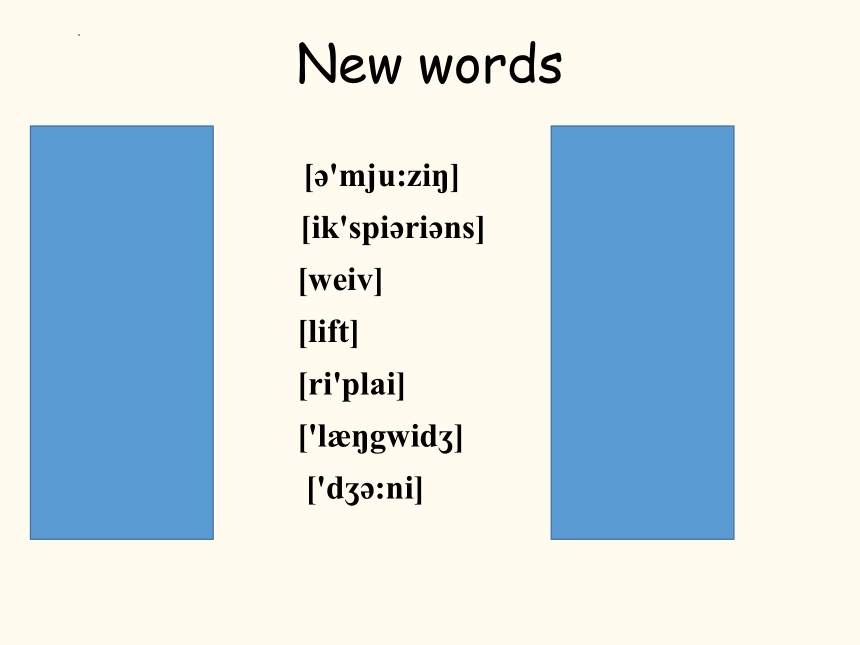
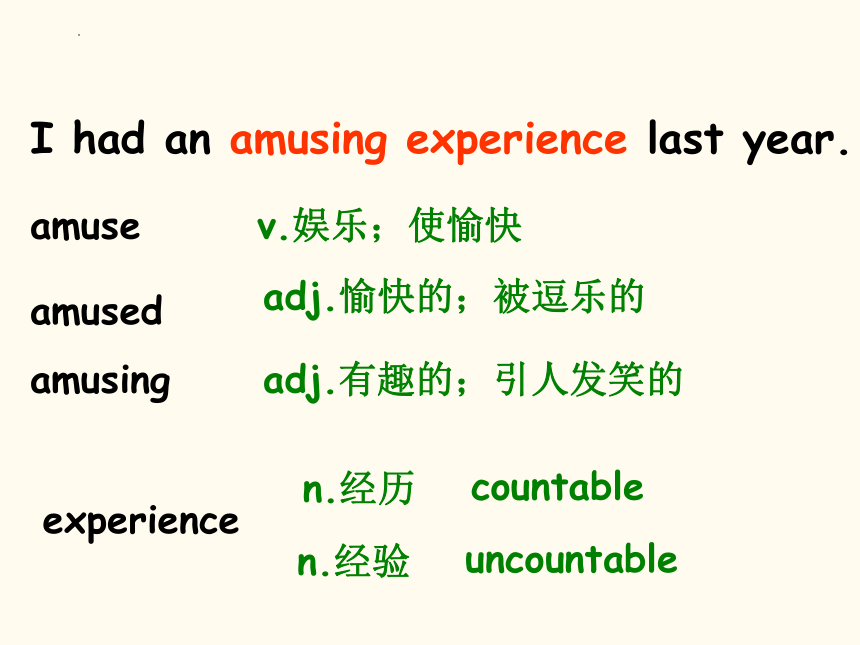
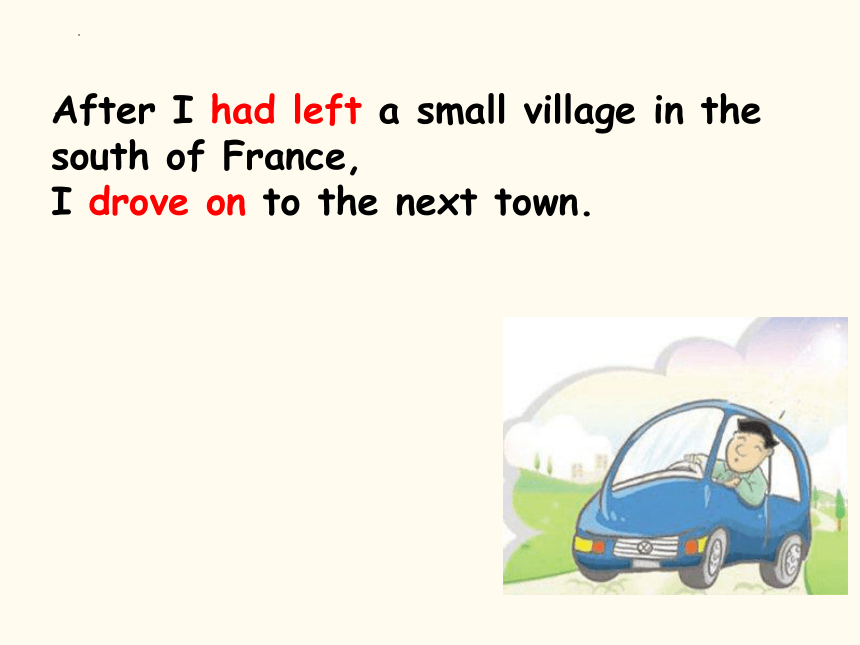
文档简介
(共15张PPT)
Lesson 14
Do you speak English
Warming up
Let's learn something about Chinese Festivals!
the Spring Festival
春节
Qing Ming Festival /
Tomb-sweeping Festival
清明节
the Dragon Boat Festival
端午节
Mid-autumn (Moon) Festival
中秋节
National Holiday
国庆节
May Day
劳动节
Double-ninth Day
重阳节
The Gragon Boat Festival is coming!
What do you know about The Gragon Boat Festival
The road ahead is long and has no ending; yet high and low I will search with my will unbending.
路漫漫兮其修远兮,
吾将上下而求索。
---屈原
Zongzi
Dragon Boat Race
Ai hao
amusing [ 'mju:zi ] adj. 有趣的
experience [ik'spi ri ns] n. 经历
wave [weiv] v. 招手
lift [lift] n. 搭便车
reply [ri'plai] v. 回答
language ['l gwid ] n. 语言
journey ['d :ni] n. 旅行
New words
I had an amusing experience last year.
amuse
v.娱乐;使愉快
amused
adj.愉快的;被逗乐的
amusing
adj.有趣的;引人发笑的
experience
n.经历
n.经验
countable
uncountable
After I had left a small village in the south of France,
I drove on to the next town.
On the way, a young man waved to me.
I stopped and he asked me for a lift.
on the way
在路上,在途中
in the way
妨碍,挡道
in a way
在某种程度上
in many ways
用许多方法;
在许多方面
As soon as he had got into the car,
I said good morning to him in French
and he replied in the same language.
as soon as
一...就...
Tom stopped play computer
as soon as his father came home.
语言作为交流手段 加in
表示说某种语言 不加in
Apart from a few words,
I do not know any French at all.
apart from
除...之外,用于句首
a few
few
a little
little
加可数名词 加不可数名词
肯定意义
否定意义
a few
a little
few
little
Neither of us spoke during the journey.
neither of
两者都不
either of
both of
which of
两者之一
两者都
哪一个
Neither of you is girl.
Either of you is girl.
Both of you are girls.
Which of answer is right
I had nearly reached the town,
when the young man suddenly said,
very slowly, "Do you speak English '
As I soon learnt, he was English himself!'
8. neither of / either of / both of / which of
我们其中有一个是女孩。
我们都不是女孩。
那两个人里面谁是女孩
我们都是男孩。
Neither of us is girl.
Which of the two is girl
Both of us are boys.
One of us is girl.
Focus on grammar
用法:过去完成时表示在过去某一时刻或动作以前已经完成
的动作,即“过去的过去”。过去完成时强调的是过
去两个动作的比较,一个在前,一个在后。
先发生的动作用过去完成时, 后发生的动作用一般过去时。
构成:had+过去分词
eg: After he had finished work he went home.
时间状语:when, before, after, as soon as ,not…until, no
sooner than,hardly…when等引导的时间状语从句中。
过 去
现 在
将 来
动作1
过去完成时
动作2
一般过去时
Lesson 14
Do you speak English
Warming up
Let's learn something about Chinese Festivals!
the Spring Festival
春节
Qing Ming Festival /
Tomb-sweeping Festival
清明节
the Dragon Boat Festival
端午节
Mid-autumn (Moon) Festival
中秋节
National Holiday
国庆节
May Day
劳动节
Double-ninth Day
重阳节
The Gragon Boat Festival is coming!
What do you know about The Gragon Boat Festival
The road ahead is long and has no ending; yet high and low I will search with my will unbending.
路漫漫兮其修远兮,
吾将上下而求索。
---屈原
Zongzi
Dragon Boat Race
Ai hao
amusing [ 'mju:zi ] adj. 有趣的
experience [ik'spi ri ns] n. 经历
wave [weiv] v. 招手
lift [lift] n. 搭便车
reply [ri'plai] v. 回答
language ['l gwid ] n. 语言
journey ['d :ni] n. 旅行
New words
I had an amusing experience last year.
amuse
v.娱乐;使愉快
amused
adj.愉快的;被逗乐的
amusing
adj.有趣的;引人发笑的
experience
n.经历
n.经验
countable
uncountable
After I had left a small village in the south of France,
I drove on to the next town.
On the way, a young man waved to me.
I stopped and he asked me for a lift.
on the way
在路上,在途中
in the way
妨碍,挡道
in a way
在某种程度上
in many ways
用许多方法;
在许多方面
As soon as he had got into the car,
I said good morning to him in French
and he replied in the same language.
as soon as
一...就...
Tom stopped play computer
as soon as his father came home.
语言作为交流手段 加in
表示说某种语言 不加in
Apart from a few words,
I do not know any French at all.
apart from
除...之外,用于句首
a few
few
a little
little
加可数名词 加不可数名词
肯定意义
否定意义
a few
a little
few
little
Neither of us spoke during the journey.
neither of
两者都不
either of
both of
which of
两者之一
两者都
哪一个
Neither of you is girl.
Either of you is girl.
Both of you are girls.
Which of answer is right
I had nearly reached the town,
when the young man suddenly said,
very slowly, "Do you speak English '
As I soon learnt, he was English himself!'
8. neither of / either of / both of / which of
我们其中有一个是女孩。
我们都不是女孩。
那两个人里面谁是女孩
我们都是男孩。
Neither of us is girl.
Which of the two is girl
Both of us are boys.
One of us is girl.
Focus on grammar
用法:过去完成时表示在过去某一时刻或动作以前已经完成
的动作,即“过去的过去”。过去完成时强调的是过
去两个动作的比较,一个在前,一个在后。
先发生的动作用过去完成时, 后发生的动作用一般过去时。
构成:had+过去分词
eg: After he had finished work he went home.
时间状语:when, before, after, as soon as ,not…until, no
sooner than,hardly…when等引导的时间状语从句中。
过 去
现 在
将 来
动作1
过去完成时
动作2
一般过去时
同课章节目录
